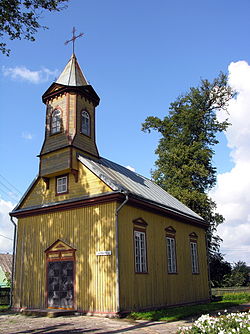Seda, Lithuania
| Seda | |||
|---|---|---|---|
| City | |||

Church of St. John of Nepomuk
|
|||
|
|||
| Location of Seda | |||
| Coordinates: 56°10′0″N 22°5′0″E / 56.16667°N 22.08333°ECoordinates: 56°10′0″N 22°5′0″E / 56.16667°N 22.08333°E | |||
| Country |
|
||
| Ethnographic region | Samogitia | ||
| County | Telšiai County | ||
| Municipality | Mažeikiai district municipality | ||
| Eldership | Seda eldership | ||
| Capital of | Seda eldership | ||
| First mentioned | 13th century | ||
| Granted city rights | 1780 | ||
| Population (2005) | |||
| • Total | 1,260 | ||
| Time zone | EET (UTC+2) | ||
| • Summer (DST) | EEST (UTC+3) | ||
Seda (![]() pronunciation ) is a city in Mažeikiai district municipality, Lithuania. It is located 24 km (15 mi) south-west of Mažeikiai on the Varduva River. There are two churches in the town.
pronunciation ) is a city in Mažeikiai district municipality, Lithuania. It is located 24 km (15 mi) south-west of Mažeikiai on the Varduva River. There are two churches in the town.
According to Kazimieras Būga, the name of Seda is of hydronymic origin and was derived from the name of nearby Lake Seda also known as Sedula. Seda was first mentioned in written sources in the 13th century. From the 15th century Seda was famous as a busy trade settlement with Livonia. The town of Seda was established in 1500 and in 1508 the parish was founded. In the middle of 17th century, Seda suffered great losses during the Second Northern War, but recovered in the 18th century. In 1770, ciwun Vaclovas Bartoškevičius and his wife Elžbieta Juškaitėthe sponsored construction of the Catholic Church of the Assumption. The town belonged to the Sapieha family, but their possessions were confiscated by the authorities of the Russian Empire for their participation the Uprising of 1831. Town residents also were active in Uprising of 1863 and book smuggling during the Lithuanian press ban. Poet and bishop Antanas Baranauskas worked in the town in 1855. The central town square is named in his honor and the monument was erected in 2000. In 1886, the western part of the town burnt down. During World War II, from June to July 1941, from 10 to 150 Jews of the village were murdered in mass executions perpetrated by an Einsatzgruppen of local Lithuanians. A stele is erected on the site of the massacre. On October 6–7, 1944, a battle took place between the Lithuanian Homeland Defense Detachment (Tevynės apsaugos rinktinė) and the Russian Red Army. Commemorating the 50th anniversary of the battle, a monument was erected to the fallen soldiers in the square near the Church of the Assumption. In 1950 Seda was granted city rights. On July 16, 2004, the coat of arms of Seda town was approved by the presidential decree.
...
Wikipedia



